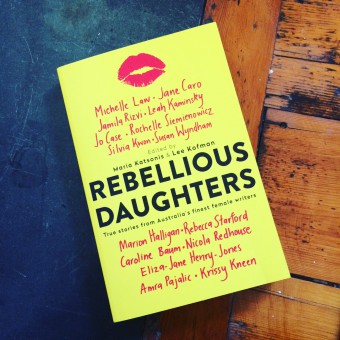
When I first received Rebellious Daughters in the mail, I unwrapped it and stared at its lively and simple cover with a mix of curiosity and skepticism. Whilst I was intrigued by the offerings of no less than 17 female Australian writers about their child-, or should I say daughter-hood, I had just recently finished reading Jonathan Franzen’s Freedom and I wasn’t sure that short stories could really offer me the depth and rawness I had become accustomed to.
I am pleased to say that my apprehension was most definitely misplaced.
Rebellious Daughters is the brainchild of Maria Katsonis and Lee Kofman, two notable Australian authors who saw the common thread between the experiences of women from various backgrounds in the passage from child to adult; a thread that could perhaps support and encourage the generation of young women that followed them. Supported in their quest by Jane Curry at the independent Sydney-based publisher Ventura Press, Rebellious Daughters was born.
“Good daughters hold their tongues, obey their elders and let their families determine their destiny. Rebellious daughters are just the opposite”, it says on the back cover. But this seeming clarion call for familial disobedience barely scratches the surface of what this book is really about.
From somewhat banal yet strangely poignant childhood exchanges with our families that subtly dictate our becomings as adults, to seminal adolescent rites of passage in bedrooms and cars and suburban streets, the stories of Rebellious Daughters are told with humour and intimacy. A ‘dear diary’-esque sense of secrecy permeates the pages, beckoning the reader to hungrily indulge in the personal recesses of these brave authors hearts and minds.
And just as those oft forgotten pages we write in our diaries as young women, Rebellious Daughters does not shy away from the pain. With the serration of honest and relatable language, many of these stories offer a subliminal confession of the guilt that so many daughters carry for their irreconcilable differences with their parents, the devastation of ancestral and migrant cultures obliviously derided in our youthful explorations of body and intellect, liberty and volition. These admissions are recounted through the lens of adulthood, which allows a greater understanding of the need for self-expression and identity in those formative years. And yet, the truth and validity of such sorrows are not denied or glossed over under the cover of modern day ‘go girl’ rhetoric. Rather, they are preciously held between the lines and behind the gazes and actions recounted across the layers of time. As such, those fragile traumas are given a space of respectful acknowledgment that deems them neither right or wrong, but as difficult happenings that we have necessarily endured.
And the reason I say ‘we’ is because that is what I feel I am part of after reading this book. I am empowered with a recognition that my plight as a young first generation Australian woman of Indian descent and the cultural, existential and personal quandaries I face in my emergence into the world are not lone battles. That indeed I belong to a collective of women that know this feeling and are out there ready to join me, pens at mast, in speaking the truth of my identity.
Just as we are there with these women as they stand shamefully with their mother’s at Sexpo, or argue with their fathers about what they want to study; when bitter beliefs of past generations poison the minds of loved ones or when the weariness of illness or divorce turns us numb and bitter; when we reject the treasures of our ancestry in a plight to fit in and feel normal and when we play the good girl long enough to find out it doesn’t bring us more love; when freedom means to abandon our parents to their suffering, and when real freedom means to forgive.
It is these underlying toils of the heart so humbly woven into the trials and failures of growing up that make me love this book. And while I haven’t the time here to name and review each story, I do want to send out this open letter:
Dear Maria, Lee, Michelle, Jane, Jamila, Leah, Jo, Rochelle, Silvia, Susan, Marion, Rebecca, Caroline, Nicola, Eliza-Jane, Amra, Krissy,
Thank you for your courage in sharing your personal stories with us in such beautiful and candid words. I have no doubt that unfolding these memories and retrieving their wounds and gifts was a process fraught with its own confrontations and insights. I want to assure you, in case you are not already aware, that those labours were not without their fruit. I am already due to pass this book on to my sister, to my best friend, to my boyfriend, because these are words that speak of so many things that I, and so many like me, seek to reconcile and accept. To be able to unearth them and look at them in my hands, across pages full of your words, has been a warm and pleasurable catharsis that I didn’t realize I needed.
I look forward to making my way through each of your memoirs over the years; to meet you each again and again in the places where we are the same and we are imperfect and we are whole.
And to anyone out there who isn’t sure that the same is true of themselves, do yourself a favour and read Rebellious Daughters – a generous insight into the exquisite quandaries of growing into yourself; a loving portrait of the journeys that birthed the women of our generation.
4 stars.
Rebellious Daughters is available via Ventura Press. A percentage of sales is donated to Victorian Women’s Legal Services.
Rebellious Daughters is written by Jane Caro, Jamila Rizvi, Susan Wyndham, Rebecca Starford, Marion Halligan, Amra Pajalic, Jo Case, Leah Kaminsky, Michelle Law, Caroline Baum, Rochelle Siemienowicz, Nicola Redhouse, Krissy Kneen, Silvia Kwon and Eliza-Jane Henry-Jones, Maria Katsonis and Lee Kofman.

